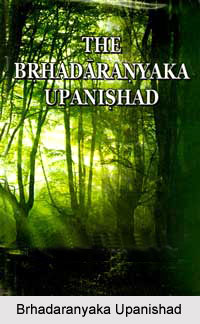 Brihadaranyaka Upanishad is known as a commentary on Purush Sukta of the Vedas. It is the ancient or `Mukhya` element of Upanishad. The Brhdaranyaka Upanishad is the secondary extraction of the Brahamana text related to the Shukla Yajur Veda. The fifth chapter of part one of Brhadaranyaka Upanishad deals with the manifestations of Prajapati.
Brihadaranyaka Upanishad is known as a commentary on Purush Sukta of the Vedas. It is the ancient or `Mukhya` element of Upanishad. The Brhdaranyaka Upanishad is the secondary extraction of the Brahamana text related to the Shukla Yajur Veda. The fifth chapter of part one of Brhadaranyaka Upanishad deals with the manifestations of Prajapati.
The father created seven provisions through understanding and penance. He assigned one as common to all and two to the gods. The made the third one for himself and gave one to the animals. On food rests everything, whatever breathes and whatever does not breathe but these foods never become exhausted although they are always consumed. Thus, one who is aware of the cause of non destruction eats the principal food; he goes to the gods and lives eternally. Seven types of food were produced by the father by practising meditation and performing several rites. The next two provisions are the different types of gifts given to the gods and the oblations offered in fire. The next provision i.e. milk is offered to the animals. Every new life at first depends on milk. However, these foods do not exhaust because the eater is indeed the cause of this inexhaustibility and he produces this food again and again. The third provision consisting of the mind, the organ of speech and the vital breath was designed for himself. This body or the atma comprises of the mind, the organ of speech, and the vital breath. These are essentially for the three worlds: the sky is the mind, the ear or `this world` is the organ of speech and the heaven or `that world` is the vital breath. These also comprise the three Vedas. The Rig Veda is the organ of speech; the Yajur Veda is the mind and the Sama Veda is the vital breath. These are the Gods. The organ of speech is the gods, the Manes comprises the mind and the vital breath is men. These are the mother, father and child. The father represent the mind is the father, the mother represent the organ of speech and the child represent the vital force. The body of the organ of speech is the earth and fire is its glowing organ. The vital breath was born from the combination of fire and the sun. Next, water is the body of this vital breath and that moon is its luminous organ.
The Prajapan is represented by the year and has sixteen parts. The fifteen parts comprise of nights and days and the constant point is the sixteenth part. Through the sixteenth part he permeates into all living beings. Thus, the three worlds are: the world of the Manes, the world of the men and the world of the gods. The father who is about to die calls his son and entrusts all these to him. He says he is Brahman, he is the sacrifice and he is the world. The son accepts it. The father tells him that whatever he has studied is all unified in the word Brahman. Whatever sacrifices he has made are all unified in the word `sacrifice` and whatever worlds he had won are all unified in the word `world.` When the father dies his own mind, organ of speech and vital breath penetrates his son. The father thus, stays on earth through his son. The divine organ of speech from the earth and fire, the divine mind from heaven and the sun permeates him. The divine prana from the water and moon also permeates him. The divine vital breath is never injured or feels any pain. The person who has realised it thus, becomes the self of all beings.



















